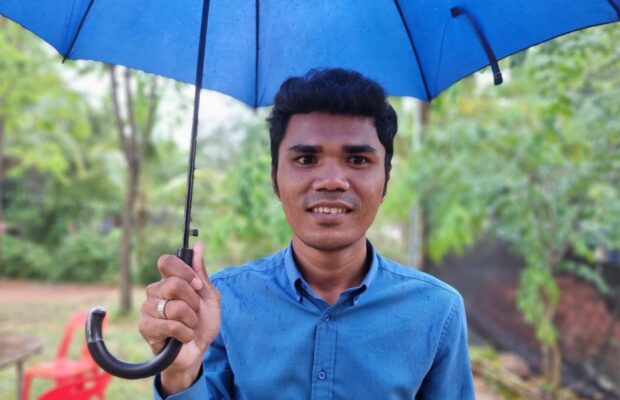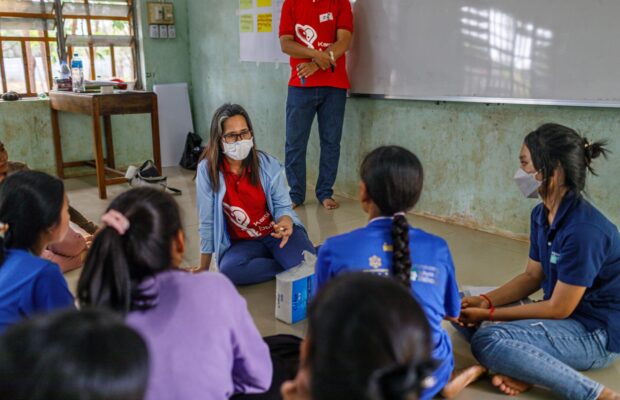
Slum, shellfish and sponsorship
The industrialisation and development of Cambodia is pushing hundreds of families to leave their villages and provinces in order to find work. Gathering in the poor districts of the capital, their dreams of a better life often turn to nightmares.
By Xavier Guignard
“I strongly recommend that you do not try it!” A surprising order, especially when it comes from the seller. However, Peneth is emphatic: the food that he sells is not for Europeans. The surrounding smell seems to support this. Aromas of garlic, chilli and seafood waft up into the polluted air of Phnom Penh, the Cambodian capital. It’s a fragrance that doesn’t bother Peneth, as he sprinkles powdered glutamate over his wares, like every morning. He sells kilos of small boiled shellfish that dry in the sun on a metal cart, made from two bicycle wheels, a rusty frame and a large aluminium sheet. A plastic stool strengthened with lots of tape provides an element of comfort. Having given his advice, the man gets to work. Seizing handfuls of rusty metal, he uses his foot to lift the chock of his cart, which starts to move with a shrill squeak. It is only just 9am when Peneth sets off, followed by dozens of sellers. The line of carts spreads out across the city’s bumpy roads. The temperature is already nearly 30 degrees.
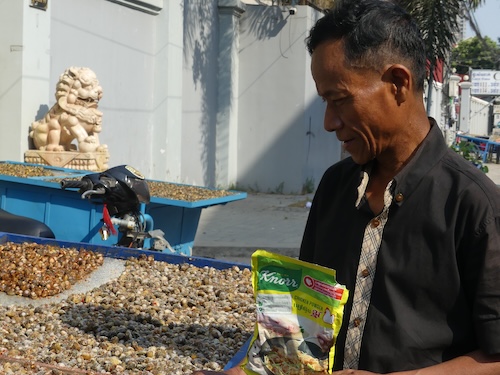

They all left their villages in the hope of finding work in the capital.
To fully dry out, the shellfish need to stay in the sun, which means the sellers have to do the same. It’s a tough exhausting job that Peneth has done every day for years.
In a good day, he can make 65,000 riels (£12) and pay back some of his debt. But it’s a risky business. When the sun doesn’t shine or, worse, it starts to rain, the shellfish don’t dry and the entire stock is lost. He then has to spend two full days selling, before returning to his neighbourhood of Boeung Trabaek.
Built alongside the lake and canal of the same name, Boeung Trabaek has a poor reputation. Every time there is heavy rain, the substandard shacks are flooded by the canal water, which is full of the city’s waste. The population increase in recent years has only made the situation worse. The government has talked of moving people out of the area for many years. When this happens, it is highly likely that the families of Boeung Trabaek will receive little or no financial compensation, their accommodation having been built entirely illegally. This sword of Damocles doesn’t bother Peneth, who learnt a long time ago to live in the moment.
A shining star amid the hardship
On the pavement opposite, a young woman greets the sellers. Langko knows each one of them. Recognisable by a hat that is as big as her smile, this cheerful indefatigable thirtysomething has been continuously helping the inhabitants of the Boeung Trabaek slum for the past 15 years. When she describes her neighbourhood, the young woman speaks above all of the kindness of its inhabitants and the smiles of its children. “Like Peneth, many of them come from the east of the country, by the border with Vietnam”, she said. “All of them left their villages in the hope of finding work in the capital”. But the dreams of a better life soon turned to nightmares, as the young woman emphasised, who is well aware of the many problems that plague the area. “The neighbourhood is made up of plots”, explained Langko. “Each owner divides their land into lots of around 18m2. On each lot, a dwelling is built with whatever resources are to hand”.
To illustrate her words, she crouched down and went inside a small house made of sheet metal and wood. She was advised not to go any further as the floor was not solid and was in danger of collapsing. Two families occupy this small dwelling. A mezzanine level doubled the surface area and provided just enough space for the eleven inhabitants to sleep. A trick that enables the tenants to share the $28 rent that the owner demands every month. Despite this, debts mount up.
Only three children from the district have been to school. They are all sponsored!
The owner has encouraged the entire families, including children, to work in selling shellfish. He is the one who supplies the ingredients every day and has also sold them the carts. So the families get even more into debt. “If they try to get supplies elsewhere or buy cheaper ingredients, their owner threatens to kick them out. He has already cut off their electricity – electricity that he sells on at a more expensive rate than the rate set by the government. These families are trapped here!” said Langko with despair.
On average, the neighbourhood’s children give up school at age 13. Their parents work 11 or 12 hours a day, while the children are left to fend for themselves. Lots of violence, drugs and alcohol. Some child marriages too. A shockingly low literacy rate completes this sad cocktail. It is this harsh reality that has encouraged Langko to take action. With the Compagnie des Filles de la Charité, she has opened a childcare centre in the heart of the slum. Parents can take their children there instead of taking them to work with them or leaving them alone. Langko provides fun educational activities and a balanced meal. Older children also have access to help with homework and supplementary classes. “When I was a student, I really discovered the joy that comes from helping the poorest,” remembers Langko. “I started off by volunteering at the weekend and then evenings during the week”.
Today, the young woman divides her day between social support for the slum’s families and her profession as a teacher. “There’s so much to do,” she continued. “Only three children from the whole neighbourhood have got as far as high school. I know them well, all three are sponsored!”
When weakness becomes a strength
Srey Keo is one of them. Her story begins just like the other children of the district. The eldest of seven children, she left her village with her parents to find work in Phnom Penh. When she was only 12 years old, Srey Keo was given several kilos of shellfish and a metal cart that she had to pull around the capital in the sun on the lookout for customers. After several hours of this gruelling work, she passed out. The following day too. Thinking that this young weak girl had nothing left to give, her parents sent Srey Keo to school. Her weakness then became her greatest strength: Srey Keo learnt to read, write and count. She was spotted by Langko and her team and offered a school scholarship.
I would like to sponsor a child in Cambodia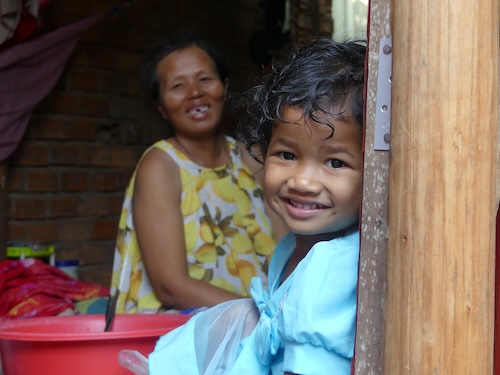
Bolstered by this support, she took the “Children of the Mekong baccalaureate”. She was at the required level so was encouraged to continue to higher education. A lover of sciences, she enrolled in the chemistry faculty of the Royal University of Phnom Penh. Children of the Mekong teams offered her a place in the Docteur Christophe Mérieux centre, which houses and supports sponsored students.
“When she arrived at the centre,” said Claire Servantie, an overseas volunteer in Phnom Penh, “we wondered if she was going to cope with the shock. She was very weak and ate little. She had never been on a bike and was not used to studying so hard. But her motivation surprised everyone. After a few weeks at the centre, she had learnt everything: riding a bike, living together, playing, laughing”.
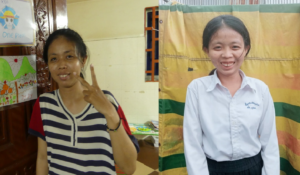
The new university year is about to start. Before going back to the centre where she now lives, Srey Keo made a detour via the Boeung Trabaek neighbourhood to see her family. She shared her emotions about the day, her pride, her appreciation too as studying had not been in her future. In the small house, her mother, pregnant for the eighth time, listened to her fondly.
Alongside them, the youngest of the family, age 3, was lying on a blanket. Already suffering from multiple disabilities, he also has pneumonia and encephalitis. Today, it’s mainly the high fever that is worrying his mother. “I couldn’t go to work,” she said, “because I couldn’t leave him alone. Srey Keo is the only one I can leave our baby with. She can understand him as though he could talk”. The child opened his mouth with difficulty. Srey Keo prepared a bottle for him, which he struggled to swallow. Despite regular hospital stays, the child’s condition continues to worsen. “It’s not the illness killing him, it is poverty!” said Langko with disgust.
Srey Keo kissed her little brother tenderly and then left for the evening classes in the Children of the Mekong centre. With her immaculate white uniform shirt, her bike helmet and schoolbag, the young girl’s appearance contrasts with the utter squalor of her home neighbourhood. “I am pleased,” confided Langko, “because thanks to girls like Srey Keo, attitudes are gradually changing. Just a few years ago, going to school was something out of the ordinary in the district. Now, those who do not go are pointed at”. For the time being, Srey Keo is concentrating on starting university the following day and this new world that is opening up to her. A world of knowledge, joy and mutual support. A world away from the Boeung Trabaek shantytown which she dreams of getting her little brother and whole family out of one day.
Read our latest news from Cambodia

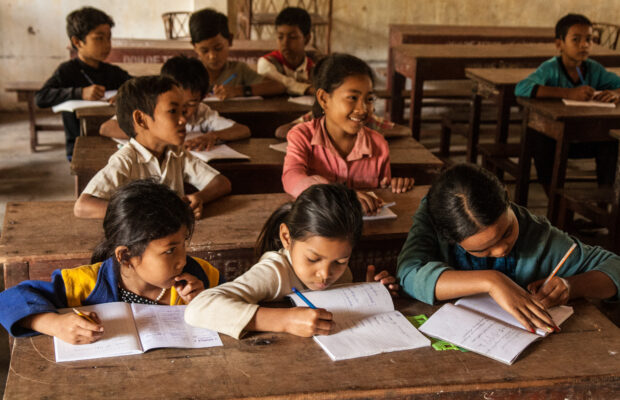
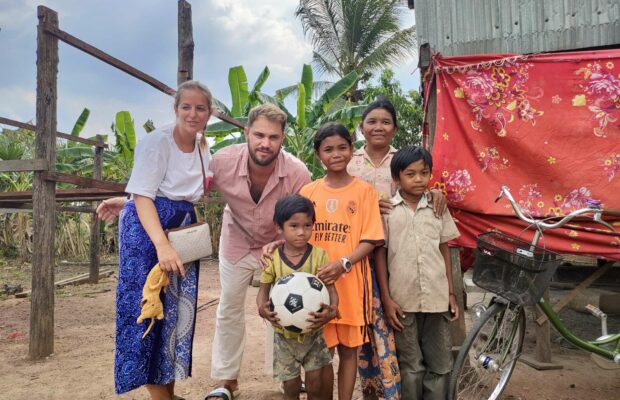
Our meeting with our sponsored child Vichika!
Kendall, Jonathan & Hugo are on a world tour with their family. They have been sponsoring the education of a little Cambodian girl, Vichika […]


